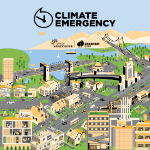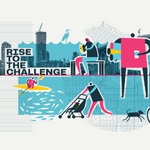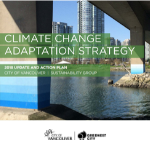
February 2023
IN THIS ISSUE
- Read our 2022 CEAP Annual Report
- Provide feedback on new missing middle housing options
- Participate in a research project about climate-friendly home upgrades
- Learn about the Healthy Waters Plan
NOTEWORTHY: The City of Vancouver, in partnership with the BC Non-Profit Housing Association, is launching a pilot program to reduce carbon pollution and increase resilience in Vancouver non-profit housing buildings. Multi-family buildings owned and operated by non-profit agencies are homes to some of Vancouver’s most vulnerable individuals and households, who may also be disproportionately affected by climate change impacts like wildfire smoke and extreme heat. Find more information about the program and eligibility here.
UPCOMING: This month, the City begins construction on the St. George Rainway, a four block green rainwater infrastructure, urban nature and active transportation project. The project will feature rain gardens to capture and clean rainwater runoff, a new local street bikeway suitable for all ages and all abilities and new habitat for a variety of species. Join the mailing list to stay up to date on the project and upcoming events here.

CLIMATE EMERGENCY ACTION PLAN ANNUAL UPDATE
Today, City Council will receive an update on our current climate action plans, the Climate Emergency Action Plan and Climate Change Adaptation Strategy, and will be asked to endorse a Climate Justice Charter for Vancouver, which explores ways to hold the City accountable to embedding equity into the development and implementation of climate policies.
The CEAP annual update highlights successes and challenges of advancing climate action over the past year, as well as key policy decisions ahead. The following are some of 2022 successes from CEA:
- The City built infrastructure to support active transportation – adding 22km of all ages and abilities bikeways, bringing the total cycling network to 331km in addition to new and upgraded sidewalks and curb ramps.
- To support electric vehicle uptake the City installed four new DC fast-chargers (putting everyone within a 10-minute drive of one), and 12 level 2 connections. To further grow the publicly accessible network, new regulations will expand charging at gas stations and parking lots from 2025 onwards.
- Vancouver adopted the first regulations in Canada to limit carbon emissions from large existing buildings and the first whole-building embodied carbon code requirements in North America.
The annual update also includes the likelihood of reaching each of the six “Big Move” targets identified in CEAP. While we are currently not on track to reach our targets, upcoming policy decisions can help us shrink the gap to our goal of cutting Vancouver’s carbon pollution in half by 2030.
YOUR TURN
Find out more by reading the CEAP update and Climate Justice Charter for Vancouver here.
You can help Vancouver get on track by sharing your voice during climate-related public engagement processes and taking individual climate action. Visit our revised webpages to find rebates, programs and other resources to help you take action here.
SUPPORTING: ADAPTATION, CLIMATE EMERGENCY

ADDING MISSING MIDDLE HOUSING TO LOW DENSITY AREAS
As Vancouver grows and evolves, we need to ensure that there are housing options that meet the needs of the diverse households that live and work here. To increase the amount of family housing, and advance our climate objectives, City staff are exploring ways to allow up to six homes on a lot, through housing options called “multiplexes”, a form of missing middle housing.
Making it possible to build more homes on a single lot means that more people, including families with children, can live in close proximity to existing schools, shops and services. Adding these new housing options in low density areas will support our Climate Emergency Action Plan and Vancouver Plan directions to create more complete, connected neighbourhoods. It’s also an opportunity to build more energy efficient housing.
YOUR TURN
The first round of public engagement to add missing middle housing options and simplify regulations in low density areas is current underway.
There are lots of ways to learn and share your thoughts about the proposed changes:
- Take our Community Survey
- Attend an open house
- Watch the Council presentation held on January 18

ACCELERATING THE SWITCH TO CLIMATE-FRIENDLY WATER HEATING AT HOME
Did you know that in a typical home, water heating is the second highest energy use, while space heating is the first? If water heating is provided by natural gas (a fossil fuel), it can create one tonne of carbon pollution annually. Making the switch to all-electric water heating in your home is good for the planet and your wallet.
The City of Vancouver is seeking participants for a research project about households undertaking this type of home upgrade. Participants will receive an honorarium to share information which may inform future program development or supportive policy changes.
Burning natural gas in buildings is the largest source of carbon pollution in Vancouver, and tackling these emissions is a key opportunity for climate action.
YOUR TURN
Submit your application to the NearZero Domestic Hot Water program here. Only 20 homes will be selected.
Want to learn more? Read all about the benefits of making the switch to all-electric water heating here.
SUPPORTING: CLIMATE EMERGENCY

CITY COUNCIL DEFINES HEALTHY WATERS ROAD MAP FOR VANCOUVER
Vancouver’s natural water cycle has been disrupted over the last 100 years by our built sewers and drainage systems, causing long-term environmental impacts, loss of safe access to our ocean and river following rain events and impacts to the food fisheries and cultural practices of the Musqueam, Squamish and Tsleil-Waututh Nations.
On February 1, City Council approved the guiding principles and goals of the Healthy Waters Plan for Vancouver. The plan will cost-effectively tackle pollution from combined sewer overflows and rainwater runoff, renew aging infrastructure, enable housing and growth and respond to climate change through green rainwater infrastructure.
As the impacts of climate change accelerate, extreme rainfall events will become more common. The Healthy Waters Plan supports our Climate Change Adaptation Strategy by creating a city that is more resilient to these changes. The Plan will also help us deliver on the Vancouver Plan, and advance commitments in the UNDRIP Strategy and the Rain City Strategy.
YOUR TURN
Learn more about the Healthy Waters Plan here.
There are many easy ways you can help steward our drainage systems and water quality in Vancouver:
- Learn what’s safe for our drainage system
- Host a neighbourhood clean-up party to keep garbage from washing into waterway
- Adopt (and name!) your own catch basin
SUPPORTING: ADAPTATION, RAIN CITY STRATEGY, VANCOUVER PLAN

When attending in-person events please follow COVID-19 health & safety precautions.
Kits Village Plastic Recycling Depot
February 16
Drop off your clean, pre-sorted plastics at this free recycling depot. Find a full list of accepted items at the link above.
Kitsilano Community Centre
Repair Cafe
February 18
Register to attend this free community repair event where to learn how to fix your belongings and divert repairable items from the landfill.
Hastings Community Centre
Everett Crowley Park Stewardship
February 18 and February 25
Join the Everett Crowley Park Committee to help remove invasive plant species, rewild native shrubs and to learn more about the history and ecology of the fifth largest park in Vancouver.
Champlain Heights Community Centre
Stanley Park EcoStewards
February 18 and March 4
Volunteer with the EcoStewards to help manage and remove invasive plant species from the park’s ecosystem. In addition to removing invasive species, you will learn about local ecology and conservation issues.
Stanley Park
Family Day Campfire
February 20
Join Metro Vancouver for a cozy campfire and enjoy stories, song and surprises about local plants and animals.
Pacific Spirit Park
First Steps to a Healthy Climate Program
February 24 – March 31
This participatory program offers parents with children under the age of five the opportunity to explore empowering and uplifting possibilities for parenting with the health of our children and planet in mind.
The Mount Pleasant Family Centre
Reuse and Recycling Drop-off Event
February 25
Bring your unwanted electronics, small appliances, clothing and more to this free drop-off event.
Trout Lake Community Centre
Neighbourhood Cleanup Party
March 11
Participate in this City-hosted event to clean up litter around Riley Park and keep the neighbourhood looking spectacular.
Riley Park
Volunteer as a Zero Waste Fixer
Do you have a knack for fixing electronics or repairing worn out clothes? Become a volunteer fixer at the City sponsored Repair Café events to help participants fix their belongings.
In person events
Farmer’s Markets
Saturdays and Sundays
Riley and Hastings Park winter markets are open. Visit the website to plan your visit and learn about the market’s farmers, food producers and creators.
Riley Park & Hastings Park
Volunteering with the Bicycle Valet
Ongoing
The Bicycle Valet’s volunteer team provides informative resources and valet-style parking at events in and around Vancouver. Join the team to support Vancouver’s cycling community and get free entrance to events.
In person events, sign up online
Streetwise Cycling Online
Any time
New to cycling? This free educational series from HUB helps adult beginner riders gain knowledge and skills to start their cycling journey at their own pace with confidence.
Online
SPEC Team Meetings
Various
Want to connect with other like-minded individuals and share your knowledge on energy and transportation, food growing, or waste? Check the link for Society Promoting Environmental Conservation meet-up topics and meeting dates.
Online
Connect and learn more
Vancouver.ca Twitter Facebook Talk Vancouver LinkedIn Instagram
City of Vancouver - 453 West 12th Avenue - Vancouver - BC - V5Y 1V4



